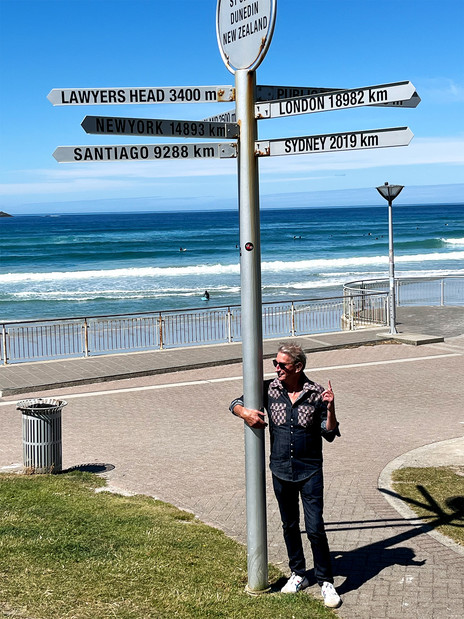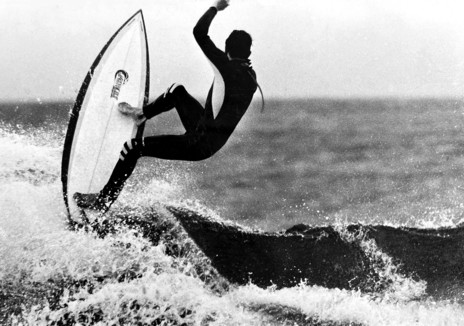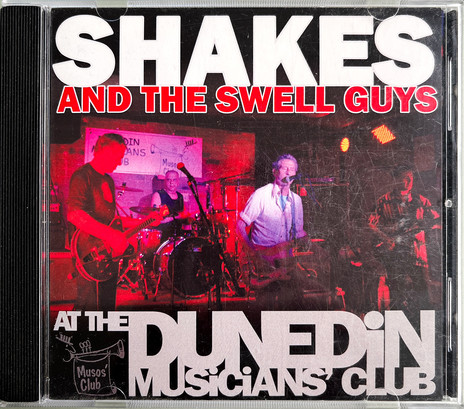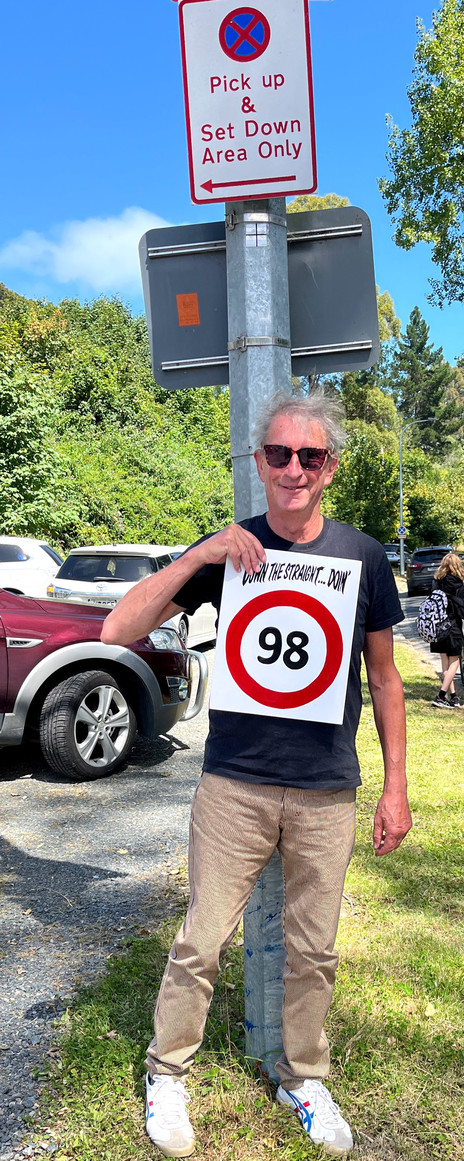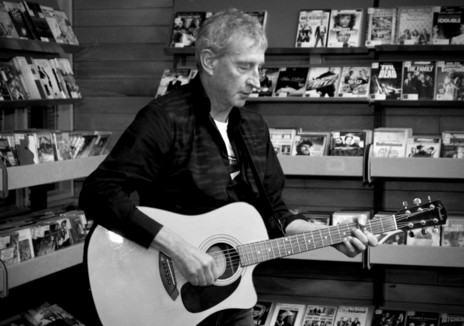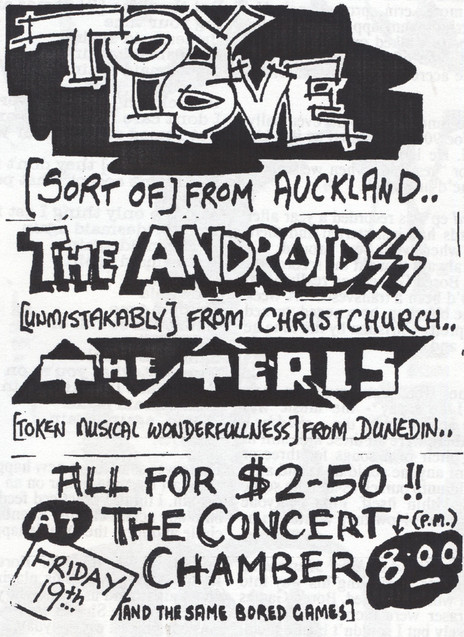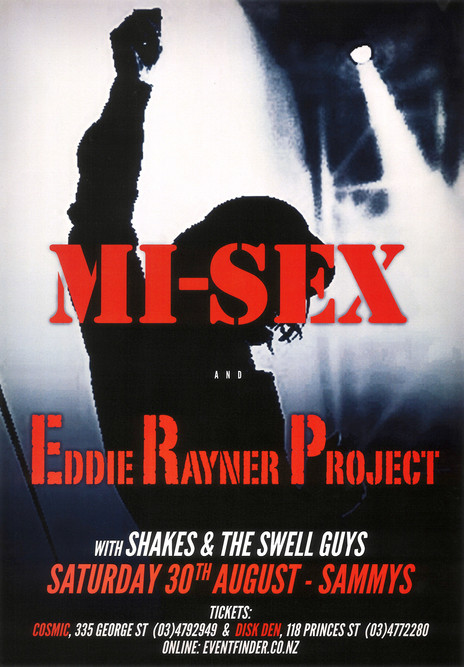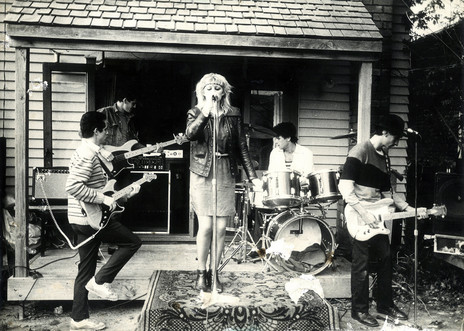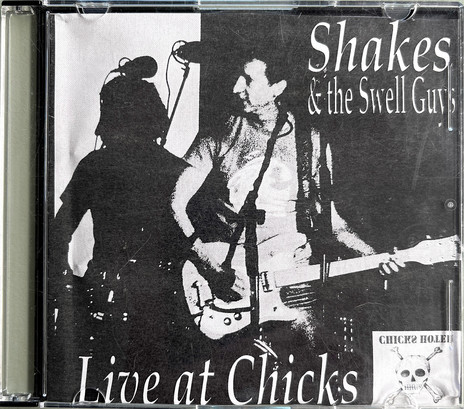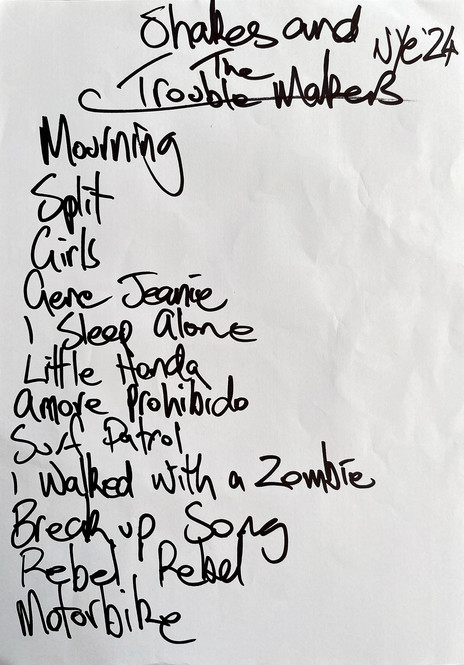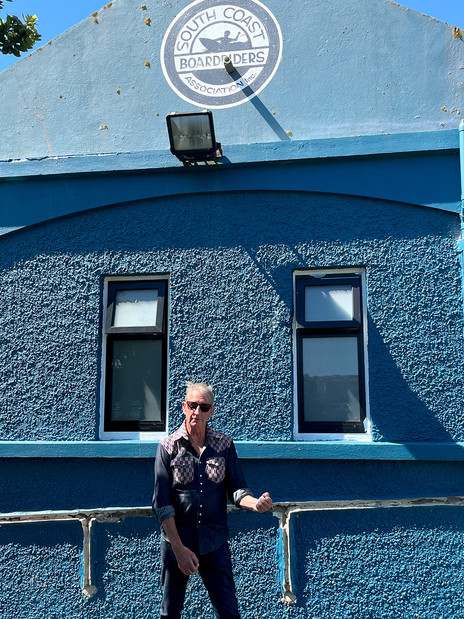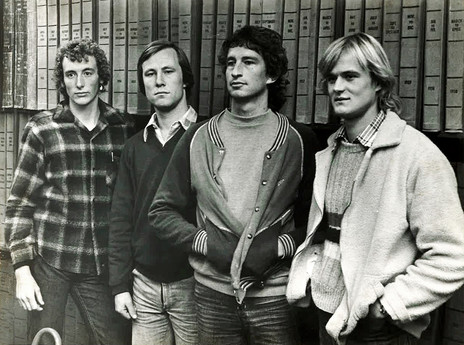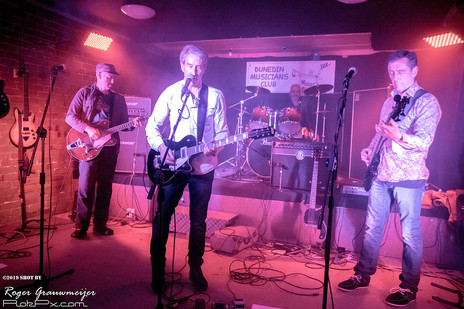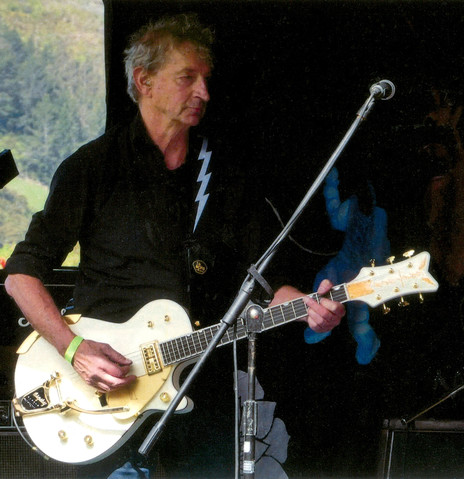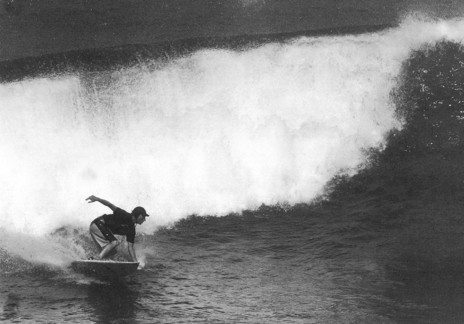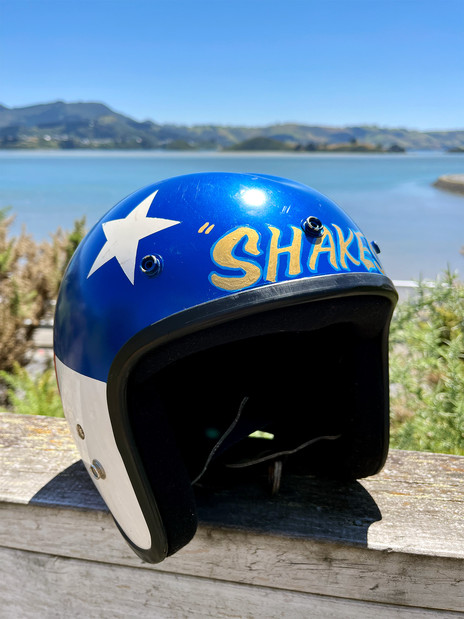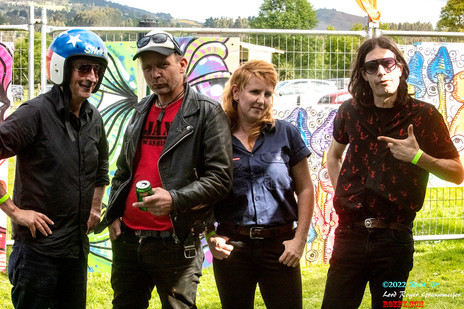In Port Chalmers, Shakes is an instantly recognisable local identity
Today in nearby Port Chalmers where Shakes lives, he’s an instantly recognisable local identity unable to walk down the main street without multiple friendly hails. Someone once called him the Mayor of Port Chalmers. A lanky well-weathered man now in his mid-sixties with an ever-present sense of humour, he doesn’t take life, or himself, too seriously.
Shakes is the survivor of a lifetime of surfing and rock’n’roll, equally at home in the water or on stage. Indeed, if you were to draw a line between the two pursuits, you’d find Shakes at the intersection, grinning cheekily with a guitar under one arm and a surfboard under the other.
Why the nickname? When Chris was a knobbly-kneed young kid he once stayed out too long in the notoriously cold Dunedin surf and when he eventually and reluctantly came back to the Surf Club clubhouse, with his teeth chattering and limbs blue with cold, the older surfers christened him with the name that would endure to this day: “Shakes”.
Shakes is the originator of what he and his mates call, with tongue firmly embedded in cheek, the “South Dunedin Sound”: surf-punk with its salty roots emanating from the South Coast Board Riders Clubrooms at St Clair beach, Dunedin’s world-renown surf spot. Yes, the term “South Dunedin Sound” is a knowing but friendly enough piss-take of the infinitely better known Dunedin Sound phenomenon that garnered much attention in the early-mid 1980s; the Flying Nun era and all that. Shakes professes that, at the time, the wider Dunedin Sound mostly passed him by. “I didn’t really know about other Dunedin Sound bands, Snapper, Sneaky Feelings, The Clean, etc.” Why? Because he was too busy surfing. But despite this he does have a claim to fame that has ensured him at least a footnote in the Dunedin Sound story; he (very) briefly played bass in progenitor powerhouse, The Enemy. In his own words:
Shakes didn’t know about other Dunedin sound bands. He was too busy surfing
“I was invited to practice with The Enemy, circa 1977, on bass which I’d never played before and I was pretty bad. Even Chris Knox was way better than me! I was shocked when I heard The Enemy. It opened my eyes. They were amazing! Mike Dooley on drums was like Keith Moon and Alec Bathgate was extraordinary on a white Ibanez playing both lead and rhythm. I practised with them for a while but struggled. Bass really wasn’t for me and I quickly handed in my resignation. I was replaced by a real bass player, Mick Dawson, with his beautiful Rickenbacker. Chris was wild! He’d practise simulating slashing his arms with a broken bottle. Later Chris was asked by an American magazine, ‘What about this guy Shakes?’ Chris replied ‘Yeah. He was involved for a few practices but we had to ditch him because his nose was bigger than mine by half an inch.’ Chris couldn’t be overshadowed in any shape or form.”
Within Dunedin’s musician folklore, other versions of Shake’s exit exist, including that he was fired by the band for wearing white freezing-worker gumboots onstage. This he quickly dismisses (“Nah, I wore those gumboots in the Terls”), putting it down to different stories becoming mixed up. Regardless, his association with The Enemy – no matter how fleeting or how it ended – is a claim to fame that has served him well.
In the 1960s and early-mid 1970s, before becoming actively involved in bands himself, the young Shakes began soaking up rock’n’roll. “I started out watching bands in my formative years and was impressed by the likes of Jimmy Taylor on guitar and other local hotties, Cruze, Thoroughbred etc. A late starter on guitar, I brought a Squier Telecaster and with no lessons figured out some chords. Three years later I was informed that they were G, D and E.”
At around the same time as his involvement with The Enemy, Shakes began jamming with a bunch of surfing friends with whom he found common ground. Thus, the Terls – probably Shakes’s best-known band – were born. They weren’t going to be called the Terls originally. In the blokey parlance of the day it was common for young men to call each other tools, as in “You’re a bloody tool, mate!” But in the nasal drawl of a surfie mate of theirs who hailed from Australia the word “tool” came out as “terl” and so the Terls they became; a band of self-described “snot-rockers”. The line-up was Shakes (guitar and vocals), Max Williams (bass), Steve Richardson (drums), and Richard Holden (guitar and vocals).
“With wet hair,” as Shakes puts it, the Terls collectively and individually set about writing a brace of original songs that would become the core of their repertoire. They included ‘You Need Love’, ‘Johnny Onion’, ‘The Last Living Man on Earth’, ‘Patti Smith’, and their signature tune, ‘Motorbike’. To this day whenever Shakes performs, currently with The Trouble Makers, it is ‘Motorbike’ – his magnum opus that has been recorded in several different versions over the years – that the punters call for. One of his mates, Mark Cameron, was so moved by ‘Motorbike’ that he even created a bespoke road sign and personalised helmet for him.
“The Terls played wild surf parties and orientation gigs, which were also pretty wild”
But the Terls were not to last.
Shakes: “The Terls played wild surf parties and Otago University orientation gigs which were also pretty wild. In 1981 we decided to go north and establish ourselves in Auckland. We flatted in Parnell and played gigs up in The Bay of Islands and down in Gisborne. We got fired from some. We also played Sweetwaters in 1981 on the Aerial Railway stage. As soon as we finished our set we promptly disappeared to our tent, exchanged the music gear for surfboards and drove straight to Raglan which was deserted because everyone was at the concert. We spent four hours surfing in perfect conditions and then it was back to the concert to catch Split Enz and Roxy Music. An amazing day. But it was the end of the road for the Terls. Our drummer and bass player had both had enough and suddenly I found myself in limbo.”
After the implosion of the Terls, Shakes joined Tomorrow’s Parties, an Auckland band with a growing profile and a seemingly promising future, comprising Monique Dully (vocals), Keith Dion (guitar and vocals), John Robertson (bass), Rodney Percy (drums) and Shakes (guitar & vocals). But it was destined not to be a lengthy tenure despite playing high-profile venues such as the Gluepot and Mainstreet and partying and playing with Kiwi rock’n’roll royalty:
“I became friends with Graham Brazier following an altercation at Dave McArtney’s birthday party. We played at an upstairs warehouse in the middle of Auckland and there were a few players there. In the middle of playing the Velvet Underground song ‘Femme Fatale’, a tall guy jumped up, pushed in front of me and started singing. I was incensed and reacted by stomping on the mic stand which came back and struck him in the face. He reacted by trying to king hit me. Luckily I was in a slightly better state than him and I ducked. His fist and half his arm got stuck in the wall. I told him, ‘This is my band! Don’t do that again!’ A bandmate whispered in my ear, ‘That’s Graham Brazier! We won’t ever be able to play in Auckland again!’ But his friends said, ‘That was great! We’ve been waiting twenty years for someone to do that!’ Anyway, he made a scene and disappeared down the stairs. Over the next few weeks I was encouraged to ring and apologise to him and reluctantly did so. His mother answered the phone and said ‘Is it the police?’ I said ‘No. Can I talk to Graham?’ He came straight on the phone, was immediately apologetic, and offered to take our band on tour with the Legionnaires, which we did.
With momentum building, Tomorrow’s Parties subsequently toured in support of Australian giants Icehouse. However, “They never talked to us once and our support band sound was compromised. Lessons in rock’n’roll!”
Despite the rising profile of Tomorrow’s Parties, all was not rosy behind the scenes. Soon enough, Shakes had had his fill of rock’n’roll Auckland style – most especially the drug-fueled aspect of its culture and what he perceived as its back-stabbing nature. He headed back down State Highway One to more comfortable and familiar environs: “I’d had enough and decided to skip back to my home, Dunedin. I’ve always been blessed with surfing to keep me afloat and to fall back on and work seemed to take up time and keep me off the streets.”
Safely back in his South Dunedin surf haven with the Auckland adventure behind him, two relatively short-lived bands ensued. First up was the covers band Rhythm Cocktail! from 1987 until 1990, comprising Grant Webb (bass and vocals), Tony Valentine and Greg Kabala (drums), John Donegan (guitar), Ted Pheloung (trombone), Peter McHenry and Gary Valentine (trumpets). Shakes: “We had brass, we were popular, and we got paid!”
Shakes on covers band Rhythm Cocktail!: “We had brass, we were popular, and we got paid!”
Next up, Shakes formed the all-originals band Tuatara with Cyndy McKenzie (bass, vocals), and Ritchie Baird (drums). While not long-lived, it was to be an important stepping-stone, morphing as it did into the band that followed in 1998 – the wonderfully named Stingray.
Although Stingray too did not endure beyond three or four years, it saw Shakes finally entering the studio to record the self-titled Shakes, his one and only (to date) solo album. Although it wouldn’t be released until 2004, the Stingray line-up of himself, Gaynor Propsting (bass), and Ritchie Baird (drums) laid down 11 Shakes-penned songs and one collaboration between Shakes, Richard Holden and John Cathro. Recorded, mixed and produced by Dunedin Sound legends David Kilgour and Alan Haig, and engineered by Stephen Stedman, the record stands as an enduring testament to the elusive and some might even say, fictitious, South Dunedin Sound. The standout track is ‘Motorbike’, partly because it’s clearly an infectious song but more-so because it epitomises Shakes himself with its visual and aural imagery of barrelling (“Down the straight – doing 98”) down the road to Brighton (a surf beach south of Dunedin) along with a good mate (“Me and Graeme”), wind in their hair and the salty taste of freedom in their nostrils (“Look at the sun ... Look at the surf”).
The album’s artwork sums up Shakes with clarity: a front-on portrait with head turned to the side and the famously Knox-challenging nose in profile, wrap-around shades, a black-leather jacket with star-emblazoned tee beneath. While the front cover presents his rock‘n’roll credentials, the rear cover draws together both the surfing obsession and his sense of humour into a brave “only Shakes would do that” moment of hilarity. Butt-naked and facing away from the camera towards the sea he stands on St Clair Beach between the two rows of iconic Groynes poles (since wiped out by southerly storms) sticking out of the sand, the sky and the sea in front of him sparkling bright blue. With one hand on his surfboard and the other on his hip, his sun-browned surfer’s skin sits in stark contrast to the uber-white freezing worker’s gumboots he wears on his feet. Ladies and gentlemen: this is Chris Prendergast aka Shakes in his self-styled world of rock’n’roll, surfing and comedic irreverence. Bloody good on ’im, aye. If rock’n’roll takes itself too seriously for your liking (and it often does) then here’s your antidote.
Following Stingray, Shakes formed his most enduring band, the cleverly named Shakes & the Swell Guys, who lasted from 2012 until 2022. It featured himself on guitar and vocals and joined variously by Anthony Pavlic (guitar), Ian Henderson (drums), Ewen Morell (guitar). Tony Ryder (bass and vocals), and Graham Dooley (drums). The ultimate party band, Shakes & the Swell Guys lit up the rock-surf scene, “touring extensively at venues large and small in central Dunedin and North East Valley, the Surf Club at St. Clair, a barn at Osborne, the Town Hall in Port Chalmers, Invercargill and Oamaru.”
Later came Stingray, Shakes & the Swell guys, the moreporks, and Men’s Support Group
Also in the more recent Shakes timeline are The Moreporks, a Port Chalmers covers band instigated by Dunedin Sound legend Robert Scott (ex Clean, Bats). “Robert Scott asked me to play lead guitar, gulp, in the Moreporks. We played everything from Tom Petty to the Stones to Buzzcocks, Stooges, and the Box Tops. I managed to pull it off … mostly.”
Mention must also be made of Men’s Support Group, an occasionally gigging revolving door of Port Chalmers musicians (of which there are plenty) which has the current lineup of Shakes, Jay Roddick (guitar and vocals), John Brockie (bass and vocals), and Jeremy Bollard (drums). Songs for the band are written by Shakes and Jay.
For the completists, there was also a short-lived party band venture called the All Stars that featured Shakes alongside David Kilgour, Mike Dooley, Martin Phillipps and Robert Scott.
Active today too are Pop Tops, a duo that Shakes formed with his partner, vocalist and conga player Monique Lammers; it specialises in a mix of originals and retro covers.
But taking centre stage for Shakes in the 2020s is his raunchy party-band-with-attitude, Shakes & the Trouble Makers, featuring the man himself alongside Pottley Mostly (bass, backing vocals), Dave Prendergast (lead guitar, vocals), and Red aka Alan Metcalfe (drums). On their Facebook page they describe themselves as “a punchy four piece band playing meaty surf-rock originals and catchy old-school covers.” Yes, it’s still the South Dunedin Sound that Shakes proudly lays claim to, but circa now: “About 2016 I was asked by Potts and Red to come for a jam. South Dunedin, my old home town, is real rock’n’roll I reckon and one day my nephew Dave came along for a jam and we were all impressed. He was a keeper, and so eventually Shakes and the Trouble Makers were born.”
Increasingly popular on their live gigs – which have ranged from Dunedin and Port Chalmers pubs and clubs, the Waitati Music Festival and the sought-after New Year’s Eve Octagon shows (2023, 2024) – in league with his fellow Trouble Makers, Shakes has clearly found his people. The cover of their just-released self-titled EP sums it up. On the front it’s all leather-jacketed, attitude-laden, sneering rock’n’roll threat (the people your mother warned you to stay away from) – with lots of black ’cept for Red’s signature red jacket – while on the back we’re all given a contrasting metaphorical wink. The puppet-master sits upon a throne smiling broadly, almost king-like, with his co-conspirators draped at ease around him. The message? Yeah, sure, we are trouble, but we also like puppies.
Chris Prendergast aka Shakes is not growing old gracefully and there’s no rust on his strings. The local neighbourhood’s Keith Richards/Jack Sparrow figure reckons “Taking things too seriously becomes a burden. I might not be the biggest thing on the block, but I’ve kept it fun.”
Touché. And regarding Matthew Bannister’s contention that Shakes should have been a star? On the beaches and in the bars of Dunedin and Port Chalmers, he is one.
